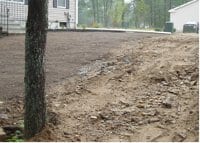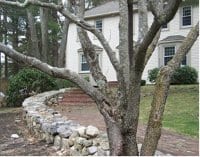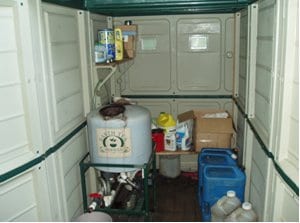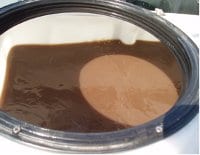by Carl Brodeur
For years I was unhappy with the results of our tree fertility program using available fertilizers on the market. Then, after attending a talk by Dr. Elaine Ingham on the Soil Foodweb, my partner and I decided to try compost teas. Once we experienced the power of compost tea on a lawn installation, we decided to make compost tea the foundation for our tree fertility program.
We use standard soil injection equipment to inoculate the root zone with highly fungal teas. By placing the compost tea in the rhizosphere of the tree roots we help colonize the root hairs with beneficial biology, which enables the plant to choose which soil microbes it will take advantage of by the exudates the plant roots excrete. This allows the plant to choose and direct its growth and make use of the microbes that will be most beneficial at that specific point in the growing season. The rest of the microbes either go dormant or become food for other biota. This process mimics what nature does in a natural setting, allowing the plant to dictate what is best for itself at that point in time. One significant benefit is that the nutrients are kept in the root zone, being retained by the soil biology and eliminating nutrient loss. Once the plant decides what it needs, it will release exudates which will trigger biological activity in the root zone and nutrient uptake will resume.
Benefits of Compost Tea
Our experience with compost tea applications to lawns showed reduction in compaction; likewise, compost tea relieves compaction in the root zone of trees. As the biology increases in the root zone and becomes active, this increased activity begins to open up pore spaces for water and air to move deeper into the soil profile. Roots can then follow fungal hyphae deeper into the soil profile and organic matter can begin to increase as roots grow and die and as soil organisms go through their life cycle adding to the organic matter in the soil. Over time this process adds long-term organic matter and makes a home for soil organisms thus improving the environment for roots to grow.
Compost tea can make a significant difference to any individual tree. For example, in 2004 and 2005 we treated the dogwood shown here for anthracnose (a leaf fungal disease) with foliar sprays. In the fall of 2005, I recommended removal because the tree had so much dieback and virtually no foliage, and it was continuing to decline. It suffered from improper pruning, target canker, poor placement in the landscape, and road salt impacts. The client wanted to try to save the tree, so I suggested trying to soil invigorate it with compost tea and corrective pruning. We invigorated the soil one time in the fall of 2005 and have not done so since then. At the same time, all foliar sprays were stopped.
The second picture was taken on April 30th this spring. Flower buds abound, the tree is beginning to bloom, and the client is very happy. As you can see the wounds still exist, but the tree is thriving.
Compost teas are a wonderful tool that can be used to promote the health of plants, but are not a silver bullet for all plant health care problems. All other cultural practices must be adhered to in order for plants to flourish in the environment. We must also keep a vigilant eye on events in nature that can have a negative impact. We are all familiar with the negative impacts of pesticides and chemical fertilizers that can set back soil organisms, but nature itself can also be devastating with droughts, floods, and torrential downpours. In a managed landscape it may become vital to introduce soil biology to facilitate quick recovery from these challenging events.
Making Compost Tea
The key to making compost tea starts with acquiring the best quality compost. We use only compost for which we can obtain a compost bio-assay. We blend vermi-compost from a certified organic farm in Pennsylvania that has proven to be effective in field applications, along with local “compost tea” quality compost and our own ramial wood compost. We try to get the greatest diversity of biology into our teas. We have a small commercial brewer which has been tested and has proven to brew consistently a quality aerated compost tea.
Testing is continually done with the laboratory at Soil Foodweb New York. Additionally, we make our own “in house” microscope observations. Working closely with the lab, a formula was developed to insure that the most effective teas are applied based on the plant material we are treating. (A soil test is recommended to the client as an essential part of the treatment program. Unfortunately many decline spending the money.) Cleanliness of all equipment is paramount, so the equipment is cleaned daily after brewing or applications are made. The tea is kept aerated all day long to prevent anaerobic conditions from occurring. Amendments are added to the tea based on need, but care must be taken as large amounts can have a detrimental effect to the biology in the finished tea.
On a closing note, we have seen a significant decrease in insect damage on properties we have maintained over the years. We believe that this is not coincidental. Application of compost tea promotes healthy plants and therefore reduces the cost for plant health care treatments and allows for a more sustainable landscape.
About the Author
 Carl Brodeur is an MCA and ISA certified Arborist and also certified by NOFA AOLCP. Carl is also an ELA Ambassador. He serves on the Board of Directors of the Taunton River Watershed Alliance and represents the Town of Freetown on the Wild and Scenic Taunton River Stewardship Council. He also teaches a course on organic land care as an Adjunct Instructor at Massasoit Community College. Carl may be reached at www.arborcareropes.com, LinkedIn: Carl Brodeur, or Facebook: CarlBrodeur
Carl Brodeur is an MCA and ISA certified Arborist and also certified by NOFA AOLCP. Carl is also an ELA Ambassador. He serves on the Board of Directors of the Taunton River Watershed Alliance and represents the Town of Freetown on the Wild and Scenic Taunton River Stewardship Council. He also teaches a course on organic land care as an Adjunct Instructor at Massasoit Community College. Carl may be reached at www.arborcareropes.com, LinkedIn: Carl Brodeur, or Facebook: CarlBrodeur






